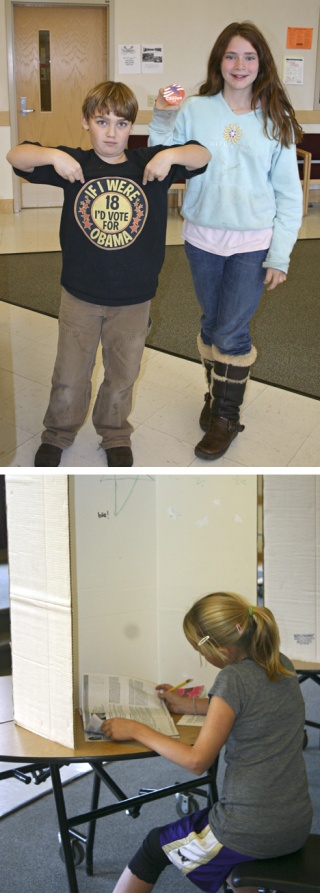Tuesday’s general election was a memorable experience for many middle-school students, most of them four to six years from voting age.
A mock election, which mimics the national election, was held Tuesday at Friday Harbor Middle School. Throughout the school day, students took the opportunity to vote for a presidential candidate, as well as candidates for local and state offices.
Voter turnout was high — 184 middle-school students, out of a total enrollment of 208, cast ballots.
Principal Ann Spratt was pleased with how the students responded to the election process.
“The kids took it very seriously,” said Spratt, remarking how students were attentive, focused and quiet during the voting. Students were encouraged to make informed choices and to leave a space blank if they were not familiar with the candidates. There were no blank ballots.
The mock election is used as a tool for teaching students about the election process. The purpose is to familiarize students with the process and importance of voting. Social studies teacher Chris Wolf — who is also an elected Friday Harbor Town Council member — organized the mock election. Hallways were filled with campaign posters created by students. The eighth-grade class was in charge of the mock election.
The issue of race and gender had little significance to middle-school voters. “They have grown up in a more colorblind society,” Wolf said.
Since the last school year, Wolf has covered the election process in his class. Emphasis upon local and state elections were stressed.
Voting took place in the commons. One by one, students were greeted by a staff member who confirmed each name as a “registered voter.” Once individual names were confirmed, students were given a ballot to complete in booths once used for art displays. Completed ballots were placed into an ice cooler. Votes were tallied at the end of the day by a selected group from the eighth-grade algebra class.
Presidential candidate Barack Obama won by a landslide. Gov. Christine Gregoire won the governor’s race. Kevin Ranker was elected to the state Senate. Jeff Morris was reelected to the state House of Representatives.
On the local level, Lovel Pratt was narrowly elected to the County Council District 1. Fay Chaffee was elected to the County Council District 3; she didn’t fare as well in the actual election.
Middle-school students voted against Initiative 985, which if enacted would open high-occupancy vehicle lanes to all traffic during specified hours, increase roadside assistance funding and dedicate certain taxes and other revenues to traffic-flow purposes. The measure failed statewide.
Students voted for Initiative 1000, which would permit terminally ill, competent adult Washingtonians expected to have six months or less to live to request lethal medication prescribed by a physician. The measure was approved by state voters.
Students voted in favor of Initiative 1029, which requires long-term care workers to be certified as home care aides.
“It takes a lot of courage to stand up and tell the world who you want to have in office,” sixth-grader Zoe Saccio said. She believes individuals have an influence on how people vote, and she expressed interest in learning if students vote differently than their parents.
Regarding the historic nature of the election, Zoe said, “It is good to be a part of this time in history because no matter who is elected president, we will still be making history.”
A number of sixth- and seventh-graders thought it was “cool” to have the opportunity to participate in a mock election. Sixth-grader McKinley Pillsbury liked the experience of exercising the right to vote.
Sixth-grader Cheristy Lutes said the mock election allowed the school administration and teachers to treat students like adults. She was pleased that the school allowed the student body to be a part of the election process.
Cheristy expressed concerns about negative campaigning among state and national candidates. “I don’t like people trash-talking them,” she said. Candidates should “talk good about themselves and what they can do to make a difference.”
Wolf said students were “passionately informed” and interested in the election as a whole. He said the students studied the impacts of campaign advertising.
“Students are not easily swayed by advertising,” Wolf said. As islanders, “they have a different view of the world because they are not bombarded by the media.”
Eighth-grader George Torres, 14, voted for Obama because the Democrat wants to help students go to college and wants to end the war in Iraq. “He’s not going to leave kids behind who don’t have enough money to go to college.”
Seventh-grader Sean Jagel, 13, voted for Obama because of Obama’s stand on the environment and the Iraq war.
Sixth-grader Sam Paul-Barrette was enthusiastic when asked about his thoughts on the election. He expressed an interest in politics and looked forward to watching the results on television that night.
Sam wore a T-shirt that read, “If I were 18, I would vote for Obama.”
“I think the United States is ready for an African-American president,” he said. “I want to be the first Jewish president. I feel lucky that I am living in a turning point of this country.”
He feels that his generation has a responsibility to make a difference. “It is up to us to change this country,” Sam said.




